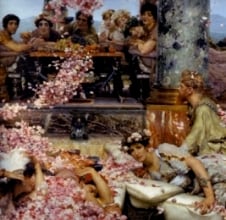Orge greche e romane? Un mito puritano posteriore
di Kate Rossmanith - 03/06/2006
| Orge greche e romane? | ||
| Secondo il prof. A. Blanshard le origini del mito delle orge greche e romane si basano in buona parte sul puritanesimo cristiano. | ||
 | ||
| Classical orgies are a myth of our own making 30 May 2006
A University researcher has dispelled a myth which has validated the saucy exploits of libertines for centuries: the widespread existence of the Roman orgy. According to Alastair Blanshard, a Greek history researcher from the School of Philosophical and Historical Inquiry, there was no such thing. "I'm sorry if there are any suburban swingers out there, but whatever you're doing, it's certainly not classical," Dr Blanshard told the audience at a public lecture in the Nicholson Museum. Dr Blanshard is studying how modern culture imagines antiquity, and how it perpetuates stories about the sex lives of ancient civilisations. He began unearthing whatever evidence he could find of illicit affairs, juicy encounters and frenzied group sex in classical Greece and Imperial Rome. The search has been entertaining but disappointing. "It's fun to look high and low, but evidence that orgies took place is difficult to find," he said. In Greece and The origins of the Greek and Roman orgy myth are partly grounded in the way in which Christianity set itself up in opposition to the sexual impropriety of the ancient gods, according to Dr Blanshard. Other reasons include the widespread display of genitals and the "ubiquity of the phallus" in ancient material. "Although de-eroticised in those times, they are understood as intensely sexual in modern contexts," he said. Modern libertines are also to blame, with many liberals using the Roman orgy myth to validate their practices. Oscar Wilde, for example, gave "classical gloss" to his encounters with boys. "He thought 'I'm doing what Socrates did'. He was classicising his 'free love' community," explained Dr Blanshard. da: http://www.usyd.edu.au/news/84.html?newscategoryid=5&newsstoryid=1074 |


